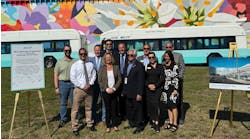BC Transit has installed 122 high-efficiency Thermo King heating, ventilation and air conditioning (HVAC) systems on its new light duty bus fleet.
Thermo King solutions had demonstrated proven performance and reliability on BC Transit's large double-decker since their installation seven years ago.
“BC Transit light duty buses are put to work in more than 130 communities across the province,” said Aaron Lamb, BC Transit's executive director, asset management. “The Thermo King units on our large double decker buses have demonstrated excellent consistent, dependable performance, so we are pleased to offer our customers and drivers the same reliable comfort on our light duty buses as well.”
The light duty buses feature the Thermo King ShuttleAIRE SLR 65 rooftop HVAC units with ClimaAIRE controllers. The SLR is a one-piece lightweight rooftop unit that offers optimal clearance both inside and outside the vehicle. The system has a low-profile design; 90 percent of service and maintenance can be performed inside the vehicle.
The SLR 65 is a compact, high-capacity roof solution that excels at air distribution to increase passenger comfort. When compared to rear or front-mounted split systems, the SLR 65 delivers superior airflow throughout the vehicle due to its centered position. The SLR can be configured in a variety of ways to deliver the right amount of cooling for a specific application.
The ClimaAIRE controller delivers precise temperature control, and features a digital display. The display simplifies the process of assessing any system issues through on-board diagnostics, and ultimately reduces service time through expedited troubleshooting.
The system uses efficient microchannel coils, yielding 40 percent less refrigerant use over conventional systems, which reduces operational cost and environmental impact.
BC Transit purchased the new units in 2012 and 2013, and may add additional units later this year.



